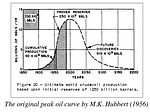TECHNOLOGY TAKES ON PEAK OIL
The term “peak oil” was coined in the 1950s by Marion King Hubbert, a geologist for Shell Oil. The theory represented a hypothetical bell curve in which our use of oil would decline when discovery of new reserves could not keep pace with our use of existing reserves. Oil after all is a finite resource. However, Hubbert's theory of peak oil has been proven wrong numerous times, even as recently as 2020. Today, however, and unfortunately for the environment, new oil exploration technology and extraction methods continue to increase proven reserves and have pushed a potential peak oil date far beyond our lifetime.
When Hubbert came up with his theory it was based on the assumption that declining reserves would be the catalyst for his hypothetical scenario, not technology. Hubbert could never have imagined a world where a battery using lithium as an anode could achieve an energy density of 600+ Wh/L (Watts per hour / Liter of material) This is 1200 percent more capacity than the best batteries of the 1950s! Nor could anyone back then have imagined a single wind turbine capable of generating 15MW of power under full capacity. And small modular nuclear reactors (SMR’s) now being developed by companies such as Rolls-Royce, are safe, modular and can provide as much power as a coal fired power plant. They produce zero emissions and there’s no possibility of large-scale contamination or meltdown associated with large nuclear facilities.
During the 1970s energy crisis, the best (and only) solution the world had was to reduce its use of fossil fuel. Fortunately, technology has given the world not only more options, but better options for over-coming our reliance on a commodity so sensitive to world events. Buying an electric car is perhaps the most straightforward option we have to lessen our personal addiction to oil, but the U.S. still produces 60 percent of its electricity from fossil fuel sources. This fact strengthens the argument of many electric car critics that charging your car isn’t any better for the environment than a traditional gasoline powered vehicle (it is better). There is no doubt, however, that we are watching a slow and historic shift away from our reliance on oil as our primary source of energy, not because of declining supply, but rather because of high prices and international climate emission reduction commitments.
As we watch sweeping sanctions imposed on Russia for its actions in the Ukraine, natural gas continues to flow from Russia into Europe, and money from Europe continues to flow back into Russia; a revenue stream to fund Russia’s aggressive military campaigns. Hopefully, this cycle of destruction will be a watershed, and the world will move forward with a serious pursuit of alternative sources of energy.


